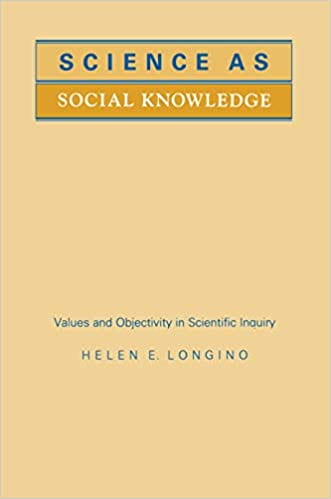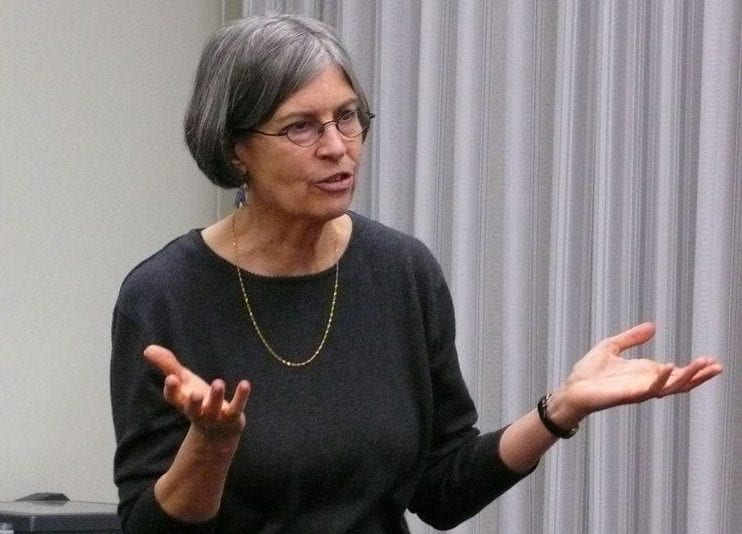Historically, men have dominated most discourses in the fields of science and philosophy. Since then, the exclusion of female perspectives and criticism has created a knowledge gap where half of humanity’s wisdom has been overlooked. Thankfully, this is changing; the world is experiencing a wave of women professionals in almost every field; and the philosophy of science is no different. In the past two and a half decades there has been a rapid surge in women philosophers and scientists. Helen Longino is one of the most influential figures in the subject of philosophy of science. In this blog post, I discuss Longino’s contributions to contextual empiricism and feminist epistemology. For the sake of understanding her complex ideologies, I support her arguments with case studies and modern-day examples to show a connection between her theoretical beliefs and real-life incidence.
Helen Elizabeth Longino, born in 1944, is a philosopher of science from the United States who is now the Clarence Irving Lewis Professor of Philosophy at Stanford University. Longino received her undergraduate degree from Barnard College in 1966, followed by a MA in Philosophy from the University of Sussex in England and a PhD from Johns Hopkins University.[1] She has presented the philosophical and scientific world with her extraordinary research on social and feminist epistemology, and because of her accomplishments, she served as the President of the Philosophy of Science Association (PSA) from 2013 to 2014.[2] Besides her achievements and honors, she is well-recognized due to her arguments on how social values and interactions should be acknowledged as an aspect of acquiring scientific knowledge.
The first step of comprehending the theories of a great thinker like Helen Longino is contextualization. We need to understand the cultural and educational background of Longino to make a sound judgment about the origin of her theories. In the preface of her first published book, “Science as Social Knowledge: Values and Objectivity in Scientific Inquiry,” Longino explains that one of her reasons for undertaking such academic research stems from her “frustration that traditional philosophy of science had so little to say about the relationship between social values and scientific inquiry.”[3] As a result, Longino decides to find a solution that “reconciles the objectivity of science with its social and cultural construction.”[4] Longino also cites her rich conversations with Jane Martin and Donna Haraway, two prominent philosophers who incorporated feminist theories into their research in the preface.
Contextual Empiricism
One of Helen Longino’s most significant contributions to Philosophy of Science is her advocacy of the sociality of scientific knowledge. Throughout her career, she has repeated how the effects of scientific research on human life and social relations are encircled by the social dimensions of scientific knowledge and how scientific research is affected by social relations and the social aspects of inquiry. To dive deeper into her thinking, I will first examine her article titled “Cognitive and Non-cognitive Values in the field of Science: Rethinking the Dichotomy.” In this paper, Longino argues for her theory of contextual empiricism, which explains that objective scientific knowledge is shaped by contextual values and biased beliefs. She explains that “no purely formal relations can be established between” data and hypothesis, and that “evidential relevance of data is secured instead by background assumptions.[5] Longino points out that because the evidence, or data collected, has no correlation with a hypothesis, researchers are forced to establish the relevance of the data to a given theory through their background beliefs to fill in the logical gap. In essence, the data collected itself is unbiased and the “least defeasible,” but the evidence arises from the data can be challenged since how the researchers narrate that data is up to his or her interpretation.[6] Therefore, the consequence of relying on the background beliefs of the researcher is that the same data collected in different contexts can “serve as evidence for different hypotheses.”[7] In “Science as a Social Knowledge,” Longino gives an example about measles to explain the basis of contextual empiricism mentioned in the previous paragraph. The model states that if we see a child covered with red spots on his stomach, then we might determine that the child has measles. This belief occurs because we assume that having red spots is enough evidence to support the hypothesis that the child has measles since “red-spotted stomach” is viewed as a symptom of the disease.[8] On the other hand, what if this belief came from a fortune teller who told us, “if this child’s stomach appeared covered with spots on a given day, she would have a disease called measles.”[9] Comparing the first example with the hypothetical example, we can see that the evidence and hypothesis are the same: red spot equals measles. However, the difference lies in why that information is perceived as evidence. In the former case, the evidence is formed by our own understanding of the viral infection’s symptoms, while the latter case sees us relying on an external source, assuming that source is reliable. Interestingly, a third case is that instead of linking red spots to measles, someone might see it as evidence for gastric disorder; this example captures the idea that sometimes the same evidence can lead to different hypotheses depending on the situation.[10]

Helen Longino 2015. Source: Wikimedia Commons (Public Domain)
Given the inevitable influence of background beliefs in the construction of scientific theory from data, Longino recognizes a problem of avoiding individual subjective biases to prevent the loss of scientific objectivity. Therefore, the question is, what can we do to control these contextual values to keep scientific reasoning as objective as possible? Longino answers this by providing a brilliant set of rules with the essence of promoting diverse perspectives. She believes that “critical interactions among scientists of different points of views were required to mitigate the influence of subjective preference on background assumptions and hence theory choice.”[11] In order to perform this function, Longino explains four features required to achieve this critical interaction and achieve mutual checks: 1, creating a publicly recognized forum to promote critical thinking. 2, the scientific community must change in response to critical discourse. 3, the community must develop standards to evaluate the relevance of criticism. 4, all community members should be granted equal intellectual authority, and consensus can only be reached through critical dialogue with no political or financial influence.[12] These four principles laid the foundation for supporting the diversification of the scientific perspective, which has the potential of checking and eliminating subjective bias from the process of theory confirmation.
Feminist Epistemology
As I discussed above, one way to enhance scientific knowledge and alleviate the effects of background assumptions on scientific objectivity is to diversify the participants. Diversity comes in all shapes and forms, but Longino specifically advocates for the inclusion of feminist values because such values can better challenge and critique the dogma presented by a homogenous group of affluent white male researchers. In essence, Longino advocates for feminist epistemology, which means the study of knowledge from a female standpoint.[13] And in order to popularize such ideas, she welcomes more women to actively participate in academia, research, and higher education roles in general.
Longino first gives an overview of the climate of feminist science in her time, specifically the lack of proper female perspective in the scientific field. She explained that a desire for feminist epistemology came to fruition when many women scientists were stereotyped as inferior researchers and were denied in their pursuit of higher academic positions. As a response to this, Longino argued in her book titled “The Fate of Knowledge” that “the exclusion of women and members of certain racial minorities from scientific education and the scientific professions constitutes not only a social injustice but a cognitive failing.”[14] She explains that inclusivity in science is not only for social equality purposes; it also has an epistemic reason: diversification leads to more critical scrutiny of unchecked past beliefs. From the division of the public sphere and private sphere to the pseudoscientific studies that described women as intellectually inferior, the devaluation and discrimination against women have persisted throughout the centuries due to a lack of female criticism. Longino believes that these biased studies, which stem from unchecked background assumptions, could be held accountable under the surveillance of new feminist values.[15]
One example that proves Longino’s point is Emily Martin’s book titled “The Egg and the Sperm: How Science Has Constructed a Romance Based on Stereotypical Male Female Roles.” In this piece, Martin, a professor of anthropology, argues that with the lack of feminist perspectives to inspect the field of Biology, the biological explanation of fertilization has been filled with sexist stereotypes and metaphors that reflects the patriarchal cultural beliefs that “female biological processes are less worthy than their male counterparts but also that women are less worthy than men.”[16] For example, texts often describe the menstrual cycle as shedding “debris” and “expelling” wastes, implying that there is some fundamental issue within the female anatomy during menstruation.[17] Unfortunately, new data in the realm of the sperm-egg interaction did not stop the scientists from making sexist stereotypes of the egg and the sperm. In particular, Paul Wassarman, professor of Developmental Biology, set the precedent of explaining how a sperm “penetrates and fertilizes the egg.”[18] This explanation crowns the sperm as the sole active player, which is far from the truth since the egg has to actively bind to the sperm as well. This egalitarian relationship is disguised as male-dominate through the perspective of the male gaze. In essence, eggs are often emphasized for their passivity and fragility while sperms are celebrated for their bravery as if they were princes traversing through challenges in order to save the princess.[19] Longino’s idea of contextual empiricism also plays a role here because it seems like when presented with fresh, objective data as evidence, scientists like Wassarman unconsciously fall prey to their biased beliefs and use such to construct their scientific knowledge. If Longino’s idea of instilling feminist values in science is carried out, we would potentially see less prejudice in research.

Science as Social Knowledge by Helen Longino. Source: Amazon.com
It is undeniably true that Longino supports the inclusion of feminist values in social inquiry, but one interesting detail is that Helen Longino refuses to essentialize womanhood by positing a single female point of view. Longino explains her concern with the argument that “women are too diverse in our experience to generate a single cognitive framework.”[20] She is not willing to collapse the views of any women into a single perspective because back then, or even in modern times, the immense wealth gap between women of different social classes means that they will receive differ qualities of education. The issue arises when we have to subjectively judge someone’s scientific claims by evaluating the social position. Does being poor support or hinder a person’s claim, how about being a particular race or gender? It is a difficult question to answer due to the countless factors that arise from individuals’ unique backgrounds.
Whether it is advocating for increased diversity in science or explaining the importance of contextual values in scientific knowledge, the applications of Longino’s arguments are undeniably significant. In her writings mentioned above, Helen Longino has argued positively on the inclusion of non-cognitive values and social forces in the process used to acquire scientific knowledge. Also, she has called for reforms in the traditional, conventional means scientific knowledge is produced and obtained. Her arguments are as essential as they are controversial. However, it is precisely this controversy that promotes critical discourse. In closing, Longino advocates for plurality in scientific knowledge and welcomes unconventional, unorthodox means and viewpoints in scientific knowledge.
About the Author:
Tim Yudong Zhang is a first year undergraduate at The University of Chicago intended to major in Economics or Biological Science. In his free time, Tim enjoys playing the drums, practicing boxing, and exploring the culinary beauty of Chicago with friends.
References:
Featured Image: Helen Longino. Source: Alchetron, The Free Social Encyclopedia 2018.
[1] “Helen Longino CLARENCE IRVING LEWIS PROFESSOR OF PHILOSOPHY, EMERITA,” Helen Longino’s Profile (Stanford Profiles, March 17, 2021), https://profiles.stanford.edu/helen-longino.
[2] Ibid.
[3] Helene E. Longino, “Science as Social Knowledge: Values and Objectivity in Scientific Inquiry,” in Science as Social Knowledge: Values and Objectivity in Scientific Inquiry (Princeton: Princeton University Press, 1990), p. ix.
[4] Ibid.
[5] Helen E. Longino, “Cognitive and Non-Cognitive Values in Science: Rethinking the Dichotomy,” Feminism, Science, and the Philosophy of Science c.1 (1996): pp. 39-40, https://doi.org/10.1007/978-94-009-1742-2_3.
[6] Ibid.
[7] Ibid.
[8] Science as Social Knowledge, 41
[9] Ibid.
[10] Science as Social Knowledge, 42
[11] Cognitive and Non-Cognitive Values in Science, 40
[12] Ibid.
[13] Helen E. Longino, The Fate of Knowledge (Princeton: Princeton University Press, 2002), 133.
[14] The Fate of Knowledge, 132.
[15] Ibid.
[16] Martin, Emily. “The Egg and the Sperm: How Science Has Constructed a Romance Based on Stereotypical Male-Female Roles.” Signs 16, no. 3 (1991): 486. http://www.jstor.org/stable/3174586.
[17] Ibid.
[18] The Egg and the Sperm, 495
[19] The Egg and the Sperm, 496
[20] Science as Social Knowledge, 188

